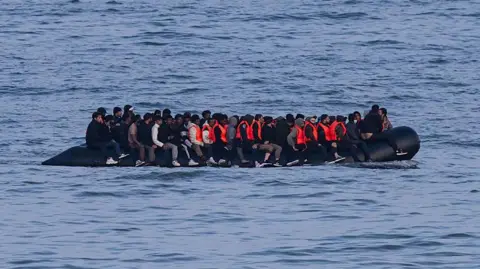**UK Signs New Migrant Return Deal with Iraq**
In a significant move to address the ongoing migrant crisis, the United Kingdom recently finalized a new agreement with Iraq, a deal focused on expediting the return of migrants who lack legal status in the UK. This arrangement marks an expansion of prior initiatives aimed at curbing human trafficking and discouraging perilous Channel crossings in small boats, a method increasingly employed by migrants seeking entry into the UK.
As of this year, the number of individuals undertaking these dangerous journeys has surged sharply, with over 27,000 migrants making the crossing, compared to around 18,000 during the same period last year. This uptick in numbers has heightened scrutiny on the government’s handling of immigration and border security.
**Government Claims Success of Cooperation**
Although the Conservative Party’s representation has criticized the agreement as “measly” given that there are currently few Iraqi nationals involved in these small boat arrivals, recent statistics show that the number of Iraqis crossing the Channel fell to approximately 1,900 in the year ending March 2025. This is down from about 2,600 the preceding year, suggesting that previous efforts at collaboration between the UK and Iraqi authorities have yielded some degree of success in mitigating illegal crossings.
The UK government’s assertion that this cooperation has been effective is reinforced by these figures, indicating that the implementation of stricter controls and improved law enforcement has made an impact.
**Formal Processes and Ministerial Signatures**
The newest deal aims to establish structured protocols that facilitate rapid returns for individuals lacking legal residency in the UK. Home Office Minister Dan Jarvis was instrumental in signing this agreement during a two-day visit to the UK made by Iraq’s Deputy Foreign Minister Fuad Hussein. Notably, it also underscores the recognition that not all Iraqi migrants who arrive via small boats will be returned, as some may be permitted to seek asylum if they can demonstrate a well-founded fear of persecution in their home country. A significant 26% of Iraqi migrants who made the crossing during the previous year were granted asylum based on initial evaluations.
**Criticism from Opposition Parties**
Opposition voices, particularly from within the Conservative Party, have expressed skepticism regarding the effectiveness of this new deal. Shadow Home Secretary Chris Philp labeled it a “sham” aimed at creating an illusion of toughness while the issue of migrant crossings continues to escalate. The UK government has recently entered into a separate £800,000 agreement to bolster Iraqi law enforcement and border security as part of an ongoing strategy to combat people-smuggling activities, a significant number of which reportedly involve networks run by Iraqi Kurds.
Minister Jarvis emphasized the importance of bilateral collaboration in addressing shared concerns such as organized crime and irregular migration. He noted, “By working together on security, development, and migration challenges, we are building stronger relationships that benefit both our countries.”
**Broader Context of Immigration Agreements**
The UK government is pushing to hasten the deportation of unsuccessful asylum seekers and foreign criminals through similar agreements. Since the Labour government took office, there have also been established contracts with countries like Albania and Vietnam to streamline such processes. Reportedly, more than 35,000 individuals lacking rights to reside in the UK have been returned in Labour’s first year, showcasing a marked increase of 14% from the same period last year.
Another recent agreement with France outlines a reciprocal arrangement whereby the UK will accept a specific number of asylum seekers in exchange for France returning some small boat arrivals, reflecting a multi-faceted approach to tackle the challenges posed by both illegal entry and the broader asylum process.
In conclusion, the UK’s latest agreement with Iraq highlights the government’s approach to immigration amid rising concerns over border security and illegal crossings. While this strategy is aimed at enhancing cooperation to combat human trafficking and illegal migration, reactions from various political factions underline the ongoing debates over its effectiveness and the broader implications for those seeking asylum in the UK.











